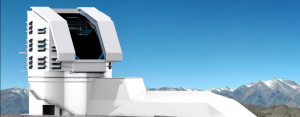Survey Science
 Survey Science is increasingly important today. Steward Observatory is involved in many large-scale astronomical projects and surveys. With our wide range of telescope apertures, we can discover quickly changing stars, we can follow up with fast cadence, and we can obtain spectroscopy with big telescopes. Steward scientists are also writing code to discover rare objects, for instance, to find high-Z quasars and low surface brightness galaxies. Below we list some of the surveys in which we are partners and in which we are actively working.
Survey Science is increasingly important today. Steward Observatory is involved in many large-scale astronomical projects and surveys. With our wide range of telescope apertures, we can discover quickly changing stars, we can follow up with fast cadence, and we can obtain spectroscopy with big telescopes. Steward scientists are also writing code to discover rare objects, for instance, to find high-Z quasars and low surface brightness galaxies. Below we list some of the surveys in which we are partners and in which we are actively working.
The Legacy Survey of Space and Time (LSST) at the Vera C. Rubin Observatory: The Vera Rubin Observatory is under construction on Cerro Pachon in Chile. The 8-m telescope will be coupled to the world’s largest digital camera for astronomy to ‘take a movie’ of the night sky every few days to address some of the most fundamental questions in astronomy. Steward Observatory has a deep commitment to the LSST project, including a) the initial telescope design, b) fabrication of the unique primary and tertiary mirror system, c) hosting its staff, and d) contributing to hiring decisions and reviews. Many faculty are active participants in LSST Science Collaborations to study active galactic nuclei, supernovae and the transient sky, galaxies and dark energy: Tim Eifler, Xiaohui Fan, Brenda Frye, Richard Green, Elisabeth Krause, Nathan Smith, Rodger Thompson, Ben Weiner, and Ann Zabludoff. The Rubin Observatory website is HERE.
Dark energy Spectroscopic Instrument (DESI) Surveys: The University of Arizona is a full member of the DESI collaboration. Steward’s contributions to DESI include: (1) conducting the Beijing-Arizona Sky Survey (BASS) project, which used more than 300 nights on Bok Telescope time with 90Prime instrument to conduct a deep photometric survey in 5000 deg^2 of the northern sky, as part of the DESI Legacy Imaging Survey for DESI spectroscopic target selection. (2) providing blue sensitive CCDs for the 10 DESI spectrographs. Steward scientists are interested in a wide range of DESI science projects, including dark energy, galaxy evolution, supermassive black hole evolution, intergalactic and circumgalactic media, near-field cosmology and Milky Way structure. Steward faculty actively participating in DESI include: Peter Behroozi, Katia Cunha, Tim Eifler, Xiaohui Fan, Brenda Frye, Buell Jannuzi, Mike Lesser, Ben Weiner, and Dennis Zaritsky. Xiaohui Fan represents Arizona on the DESI Institutional Board. The DESI website is HERE.
Sloan Digital Sky Survey (SDSS): The University of Arizona is a full member of the SDSS III (2009 - 2015), SDSS IV (2015 - 2020), and SDSS V (from 2020) collaborations. Steward faculty have led the development of using Baryonic Acoustic Oscillations to measure the evolution of dark energy with SDSS, as well as investigations of the evolution of high-redshift quasars discovered in the SDSS, and studies of supermassive black holes in the SDSS reverberation mapping project. Steward also contributed the near-IR detectors used in the SDSS APOGEE instrument, and is providing CCD detectors and other components of the Local Volume Mapping instrument for SDSS-V. Steward faculty actively participating in the SDSS include: Chad Bender, Gurtina Besla, Katia Cunha, Xiaohui Fan, Kate Grier, Serena Kim, Katlin Kratter, Mike Lesser, and Ed Prather. Xiaohui Fan represents Arizona on the SDSS Advisory Council, and Chad Bender represents Arizona on the SDSS Collaboration Council. The SDSS website is HERE.
The DECam Local Volume Exploration (DELVE) Survey: DELVE seeks to understand the faintest and most dark-matter-dominated galaxies. DELVE is a deep, multi-component survey using DECam on the 4-meter Blanco Telescope at Cerro Tololo Interamerican Observatory in Chile. DELVE will combine existing DECam data with 126 nights of novel observations to enable dwarf galaxy detection detection over a broad range of luminosity. Steward faculty actively participating in DELVE include David Sand. Steward Postdoc Burcin Mutlu-Pakdil is the Early Career Management Representative. The DELVE website is HERE.

For Public
Public events include our Monday Night Lecture Series, world-reknowned Astronomy Camp and Mt Lemmon Sky Center.

For Students
A good place to start if you want to become an undergrad major or grad student, or need to find our schedule of classes.

For Scientists
Find telescopes and instruments, telescope time applications, staff and mountain contacts, and faculty and staff scientific interests.




